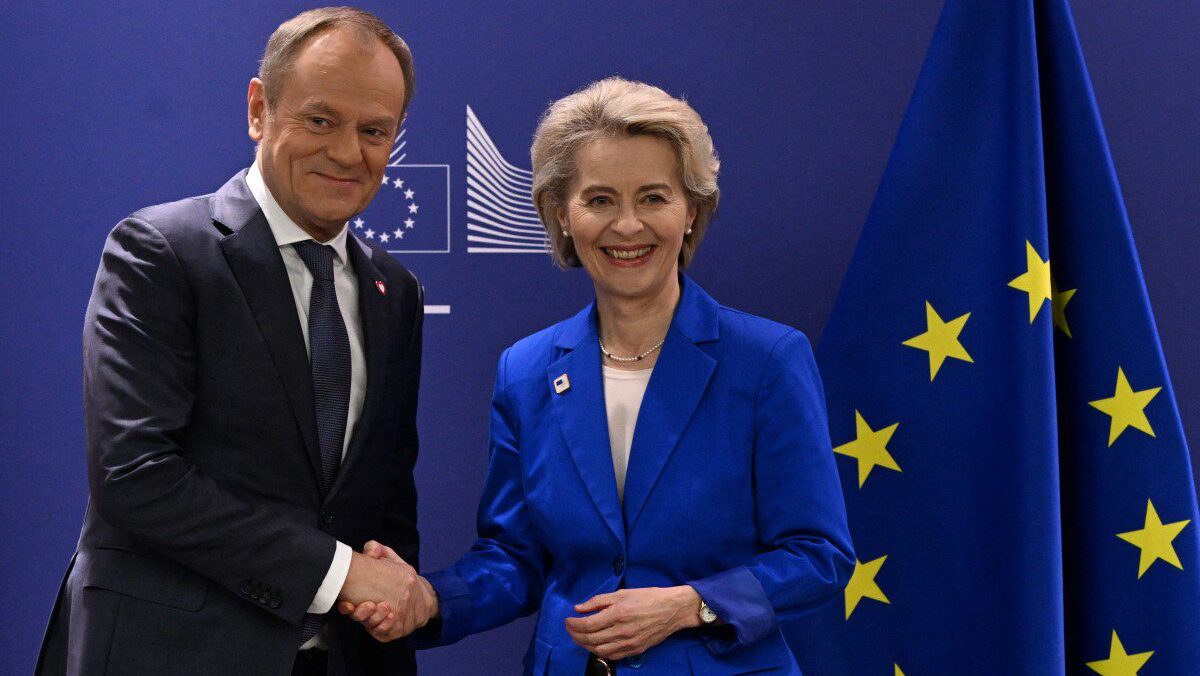
Polish PM Donald Tusk and EU Commission President Ursula von der Leyen
Photo: John Thys / AFP
Polish Prime Minister Donald Tusk is ready to green-light the EU’s controversial Migration Pact—the one that the previous conservative Law and Justice (PiS) government vowed never to accept—while choosing to pay the enormous fines set by the Pact.
Former deputy justice minister Sebastian Kaleta—now serving as MP—used his social media to declare that he inquired about the Tusk government’s intentions towards the Migration Pact. In response to his query, he was informed that there were “no decisions or plans” to block the Migration Pact from becoming law in its current form on Monday, January 29th.
This flies in the face of the democratic wishes of the Polish people. A clear majority of Poles were always against the mandatory relocation scheme, and PM Tusk has at least formally understood this.
Essentially, what Kaleta implies is that accepting the Migration Pact is like writing a blank cheque to the European Commission.
The Pact’s most controversial item is the so-called “mandatory solidarity mechanism”—an annual relocation scheme that would force countries to either accept the number of migrants decided by the European Commission or pay a hefty €20,000 for each that has been turned down.
“I want to assure you that Poland will not accept illegal migrants under any such mechanism. We will not accept a single migrant,” Tusk promised earlier this month, but without saying anything about the other option—paying hundreds of millions (at least) each year—that’s seen just as unacceptable by most voters in the country.
“At the moment, Donald Tusk’s government plans to pay the amounts set by the European Commission if the Migration Pact comes into force,” Kaleta warned on X.
[BLOCK] The problem is that how much Poland should pay would be decided arbitrarily … by the European Commission itself. It may be a billion or even several billion a year. Tusk’s government doesn’t care!
BOOM‼️ Rząd Donalda Tuska nie zamierza blokować Paktu Migracyjnego ‼️
— Sebastian Kaleta (@sjkaleta) January 29, 2024
Wynika to z odpowiedzi na moją interpelację. Pytałem o to czy rząd będzie przeciw i ewentualnie skorzysta z każdej dostępnej prawnie formy zablokowania paktu, gdyby wszedł w aktualnym kształcie. Dostałem…
Under the current plans, the minimum number of migrants that would have to be redistributed among member states would be set at 30,000. The word “minimum” is important, as any sudden uptick in arrivals can trigger additional numbers set by the Commission.
Even the minimum relocation quotas will have to be renegotiated each year, with the text proposing steady growth over the next decade. It’d be naïve to expect it to remain at 30,000 for the entire EU, given that the total of known illegal arrivals reached 275,000 in 2023.
Once the Pact has been finalised, the genie will be out of the bottle, and EU countries that don’t want any more migrants will have to pay whatever penalty Brussels presents them with.
Furthermore, many conservative MPs in Poland harbour doubts about Tusk’s intention to reject migrants as well.
“I will remind you that during the previous Civic Platform (PO) governments, centres were being prepared in secret to house migrants,” PiS MEP Dominik Tarczynski noted. “Therefore, I suspect that now, similarly, the current authority will want to camouflage its decisions on this matter.”
The implementation of the Migration Pact was blocked by Poland and Hungary last summer, but Brussels is preparing for a final push to get it over the finish line before this June’s EU elections. With Tusk seemingly on board, however, it will be much harder for Budapest to keep rejecting the solidarity mechanism.
